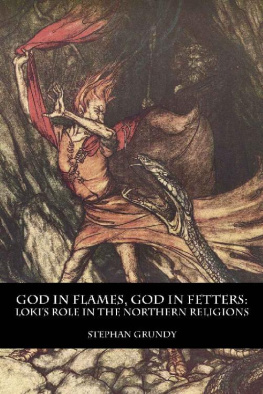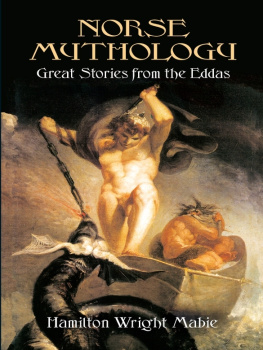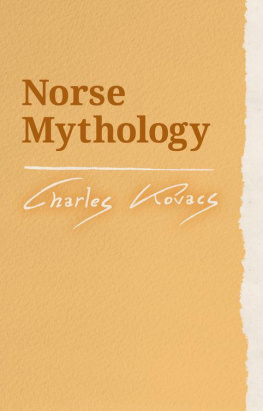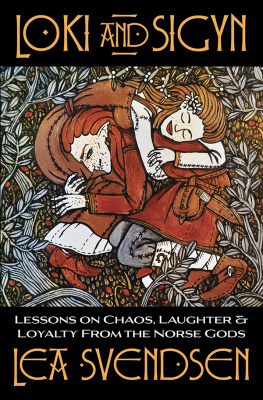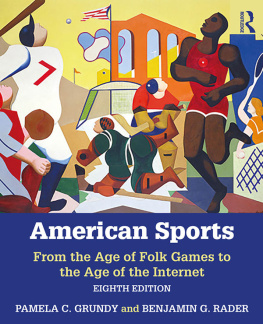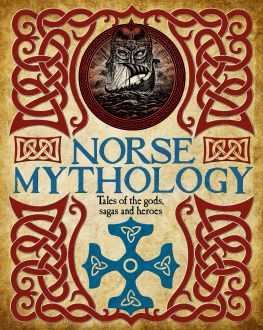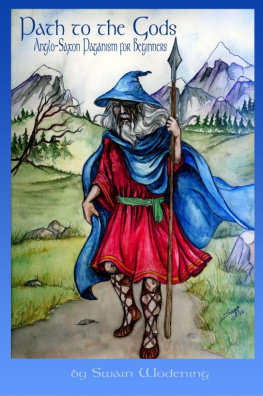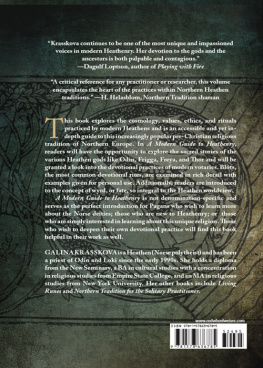2012, 2013, 2015, Stephan Grundy. All rights reserved. No part of this book may be reproduced or transmitted in any form or by any means, electronic or mechanical, including photocopy, recording, or any information storage and retrieval system, without prior permission in writing from the publisher. Exceptions may be allowed for non-commercial fair use for the purposes of news reporting, criticism, comment, scholarship, research, or teaching.
Originally published in Idunna #93, #94, #95, #96 (ISSN 1937-397X)
This edition published by The Troth
24 Dixwell Avenue, Suite 124
New Haven, Connecticut 06511
http://www.thetroth.org/
ISBN-13: 978-1-941136-06-5 (paperback), 978-1-941136-07-2 (hardcover)
Cover image: Arthur Rackham, illustration from The Rhinegold & The Valkyrie , 1910.
Cover design: Ben Waggoner
Troth logo designed by Kveldlfr Gundarsson; drawn by 13 Labs, Chicago, Illinois
Typeset in Garamond 18/14/12/10/9
EDITORS PREFACE
In the council of the gods there is no figure more arresting than that of Loki. He was a favourite of the poets in the viking age; they gave him an ample chance of playing the villain in the piece, and in their poetical myths extracted the full measure of slyness, double-dealing, cock-sureness, effrontery, cunning, cowardice and foolhardiness that lay hidden behind his sleek, ingratiating features. He becomes the leading character in the tragedy of the world, the most entertaining person in the history of the gods and at the same time the sinister power who shapes the fate of the world by his strength of weakness and his daring of cowardice. The threads of a destiny involving gods and men meet in his fertile brain and are twined by his ready wit and spiteful cynicism into a net that draws the whole world into the abyss of death....
This subtle friend of the gods is rather refractory to a sober method of analysis dividing him into mythological and folkloristic elements. As a matter of course he has been caught time upon time and placed on the anatomists table, has had his body dissected and his inner organs numbered as belonging partly to a corn spirit, partly to a spirit of nature and partly to something else; but the analysis has never succeeded in depriving him of his deftness and agility, he slips from under the hands of the anatomists and springs to his feet ready with a shocking jest.
Some readers may find this book confusing. In many ways it is a work of academic scholarshiphowever, it deliberately addresses issues that the average academic is not likely to be familiar with. A little background is probably necessary for readers who are unfamiliar with the issues that this book was written to address.
Heathenry is the most inclusive term for a series of religious movements that originated in the early 1970s in the United States, England, and Iceland. What these movements have in common is a deliberate attempt to revitalize the ancient religions of the Germanic-speaking peoples of Scandinavia, England, and continental Europe, with the aim of forming a faith tradition that is deeply rooted in the ancient past and yet can speak to the needs and concerns of modern people. Heathen religious practice includes worship of the old gods and goddesses, various beings that inhabit the natural world (generally called wights or vttir ), and worthy ancestors and heroes, both those recorded in old lore and those in recent memory. Heathenry draws on surviving medieval texts, such as the Old Norse Eddas and sagas; on folklore recorded in relatively modern times; on archaeological discoveries; and on the work of academically trained scholars (including some who are also practicing Heathens). At the same time, Heathenry has developed and continues to develop its own customs and traditions in the present day, and its own ways of understanding and communicating with the ancient deities. Heathenry is a living religion, if still numerically small, and it is far more than re-enactment; Heathens are collectively developingand sometimes heatedly debatingtheir own common practices and understandings, including some that are not directly recorded in the Lore.
Heathen denominations include satr, based primarily on Norse mythology as preserved in the Icelandic Eddas and sagas; Theodish Belief, originally based on surviving Anglo-Saxon mythology, folklore, and social structures (although some strains of Theodish Belief draw on other related Germanic cultures); and a variety of others, including Odinism, Irminism, Forn Sed, Northern Tradition, and still more. There are also individuals and groups that do not align with any of the above and simply consider themselves Heathen. Heathenry generally considers itself sharply distinct from the better-known Wicca in its theology and practice, although there are some Wiccans who worship the Norse or Old English deities. Outsiders to Heathenry dont always perceive the various differences among these groups, and sometimes lump them all into Neopaganism or New Age religiona characterization that makes most Heathens hiss and spit.
As the quote that opened this preface makes clear, and as the text of the book should make even clearer, scholars have long been unsure exactly what to do with Loki. Contemporary Heathens cant seem to decide on what to do with Loki either. The question of whether or not to honor and worship Loki is a long-standing one in American Heathenry. It is generally agreed in Heathenry that he is a god of Chaos and Chance and Change, of disruption and disorder that can nonethelesssometimesbe beneficial in the larger scheme of things. In this regard he is often compared with Trickster figures in other mythologies. The question, however, is whether or not drawing his attention by worshipping and invoking him is worth the risk, given the way that he causes chaos and disorder in the surviving myths.
Some Heathens have found it beneficial and fitting to worship Loki. In an article first published in 1983very early in the history of Heathenry in Americaand reprinted in The Troths journal Idunna , Alice Loptwyn came to the following conclusion:
Conflict, dissension, struggle, exertion, endeavorthese are the qualities that move the world and the universe. Without them, we would be as the stones, unmoving, uncaring, and untroubled. Loki is the force that disrupts your life, that stirs you from the comfort and peace of your fireside and forces you out to battle; he can turn your world upside down and change every cherished idea you hold dear, but with him in your life you need never fear boredom.
Sometimes Loki is worshipped simply as one of the Gods among many, but there is now a community of people who feel an exceptionally strong personal bond with Loki, one that may not be present with the other gods. Author Galina Krasskova is one with a deep devotion to Loki:
Loki is the enemy of entropy, of complaisance, and He fights it with a vengeance. He is the enemy of a heart without passion, devoid of devotion. He can be wrenchingly cruel to His children, but in hindsight, it is never cruelty , but rather the firmness of a parent to an erring child. And therein lies the secret to His motivation: He forces us to accept the full weight of our wyrd, to open to the myriad ways in which the Gods may inspire us, and to actively claim our own potential and the responsibility that comes with it. He can be a bastard, its true (and I say this, loving Him dearly), but Hes a bastard with a purpose.
Krasskova has gone on to publish both essays and devotional poetry dedicated to Loki, his wife Sigyn, and their sons Vali and Narfi. Although little is said about Sigyn and her sons in the surviving myths, Krasskova has developed an impressive body of theology from the sparse textual evidence available. She and others express their devotion in powerful imagery:

